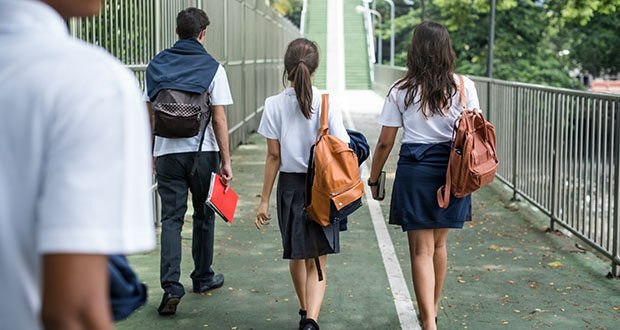Young women who wear school uniforms are more likely to experience harassment in public spaces, according to a new study from Melbourne University.
Researchers interviewed 47 individuals who recalled their earliest memories of public harassment, and for the majority, their first experience had occurred while wearing a uniform.
The study also found young women in Australia experienced street harassment more frequently while wearing school uniforms.
"There's something about just being a young woman in public space to start with, the vulnerability that can come with being younger," the study's co-author criminology lecturer Dr Bianca Fileborn said.
"But then for school uniform, specifically for people, it signifies youth and young age.
"That's often quite sexualised in popular culture."
Study participants recalled strangers often perpetrated the harassment they experienced, usually a man or group of men who knew they were underage as they were in school uniforms.
"Walking from high school to home, that's where most of the harassment I've experienced happened. As soon as I stopped wearing a school uniform, it happened less. So that's disgusting for a lot of reasons," one participant said.
Public harassment can range from catcalling, staring wolf-whistling, and being followed by men in cars while walking to school.
In Australia, about 78 per cent of women reported experiencing public forms of sexual harassment last year.
Government data also showed that about 2 million Australian women have been victims of stalking since age 15.
Dr Fileborn said street harassment can "profoundly" impact how young women access public spaces.
"There is a whole range of emotional impacts, and for some people, this impacted them across their life," she said.
"People would talk about changing how they walked home, for example, so that they were like on the main road or taking a route that they felt was safer."
In Australia, 97 per cent of women report they use strategies to avoid street harassment.
According to Dr Fileborn, the "cultural trope of the sexy school girl in uniform" has normalised harassment against young women in Australia.
"If you google a school girl, you'll get the sexy pictures, whereas if you google schoolboy, it's a child in a school uniform."
In their study, researchers found that young women often did not report nor talk about their experiences, under fear of being blamed.
"Young women's uniforms were often the same around the length of bed dress, and that was a barrier to reporting the incident to teachers; they were scared the response would be 'look at how short your dressings'," Dr Fileborn said.
"This facilitates the actions of these men; you've got the normalisation of the harassment and young people who won't talk back or report the incident.
"There are no consequences."
She said that schools have a key role in educating students about street harassment and helping shift the blame from the victim to the perpetrator.
"One thing that was clear from the study was the need for education," she said.
"Schools should ensure that there's comprehensive sexual education embedded in the curriculum and teaching young people about harassment, sexual violence, sexual ethics and consent.
"I think part of that can also involve prevention work by challenging the drivers of gender-based violence, challenging conceptions that harassment is just a compliment or that it's not a big deal."
This week, two schools in Perth issued a warning to parents after a man allegedly took inappropriate photographs of students outside of a local train station.
The man was later charged with 40 counts of child sex offences.
In Australia, around 86 per cent of primary and 96 per cent of secondary schools have a uniform policy.
According to the federal education department, uniforms promote a "sense of belonging for students and create a positive identity for the school community."
Dr Fileborn said the research suggests that removing school uniform policies would help to promote student safety.
"While it won't stop young people from being harassed, it can reduce street harassment as young women are targeted and fetishised due to their school uniforms," she said.
"It would also be a good idea to give them more freedom regarding what they wear when coming to and from school."
Do you have an idea for a story?Email [email protected]
 Education Review The latest in education news
Education Review The latest in education news

One comment
Pingback: ผลการศึกษาชี้ "ชุดนักเรียน" ทำให้เด็กสาวถูกล่วงละเมิดทางเพศมากขึ้น